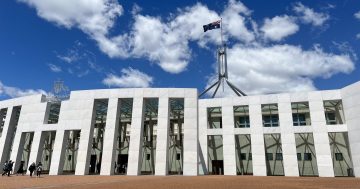
Alan Dixon and Christopher Brown will not be liable for any of the suit’s proceedings. Photo: Federal Court of Australia.
The Federal Court of Australia has approved a $16 million settlement in a class action lawsuit brought by Shine Lawyers against wealth management firm Dixon Advisory, once the adviser of choice to Canberra public servants.
As a result of the settlement’s recent approval, Shine’s proceedings against Dixon Advisory & Superannuation Services Pty Ltd (Dixon Advisory) have been permanently stayed without admission of any liability.
Other claims filed by law firm Piper Alderman against E&P Financial Group Limited (the firm’s parent company), Alan Dixon (the firm’s former managing director and CEO) and Christopher Brown (former CEO of Dixon Advisory Australia) have been dismissed.
Dixon Advisory collapsed in 2022 after multiple compensation claims and three legal actions were launched against it in the year prior.
Around 4600 of the firm’s clients were found to have received inappropriate advice that failed to act in their best interests.
Between 2015 and 2019 the firm was the responsible licensee of six representatives who improperly advised clients to invest up to 20 per cent of their portfolio in the US Masters Residential Property Fund (URF), which was established by Dixon Advisory.
The URF invested client funds into apartments in the New York area, while charging exorbitant fees as it took on large amounts of debt to finance more properties and renovations. Eventually the fund’s portfolio amounted to $1 billion.
According to a claim made by ASIC, the URF paid $135.9 million in fees to Dixon Advisory and other related parties from September 2015 to 30 June 2018.
Over five years the myriad fees, escalating debt, and overinvestment led to the fund’s unit price declining from $2 to 32 cents.
Due to the advice of Dixon Advisory, its clients’ self-managed super funds were put in a highly vulnerable position as they were insufficiently diversified and exposed to risk of capital loss.
A $7.2 million penalty was imposed on the firm by the Federal Court in 2022 after it found Dixon Advisory representatives had not conducted a reasonable investigation of the clients’ circumstances before providing the advice. They were also ordered to pay ASIC’s legal costs of $800,000.
Former clients who suffered losses as a result of the firm’s financial misconduct can make a complaint to the Australian Financial Complaints Authority (AFCA), as they may be eligible for up to $150,000 through the Compensation Scheme of Last Resort (CSLR).
The CSLR was established in June last year, to fill a gap in consumer protections by helping those unable to get compensation from insolvent firms. Its initial budget of $270 million was partially funded by financial advisers.
According to consulting firm Finity, around 79 per cent of the compensation scheme’s funds are expected to be distributed among those who were impacted by Dixon Advisory’s financial misconduct.
All claims by former clients must be lodged by the end of this month when Dixon Advisory will cease to be a member of AFCA.
The Institute of Financial Professionals Australia (IFPA) said it was deeply concerned about the retrospective aspect of the CSLR levy and the cost advisers would have to pay for the compensation scheme’s operation.
IFPA’s head of superannuation and financial services, Natasha Panagis, said advisers should not be expected to fund compensation claims for legacy complaints that occurred prior to the establishment of the CSLR, especially in relation to Dixon Advisory, which went into administration more than two years before the scheme’s inception and is the largest legacy payment under it.
“At a time when there is a shrinking adviser pool coupled with the higher ASIC supervisory levy and other rising operating costs, advisers will have no choice but to pass this extra cost onto their clients,” said Ms Panagis.
“If the government wants advisers to remain in business and attract new entrants, it should not burden existing advisers with more costs and instead fund all legacy complaints that occurred before the CSLR scheme was set up.”











